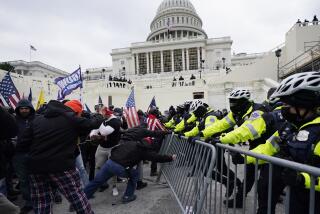‘We Tried Hard, But ... We Failed’
Excerpts from Wednesday’s testimony before the commission investigating the terrorist attacks of Sept. 11, 2001:
Richard Clarke
Former counterterrorism advisor under Presidents Clinton and George W. Bush.
“To the loved ones of the victims of 9/11, to them who are here in the room, to those who are watching on television, your government failed you. Those entrusted with protecting you failed you and I failed you. We tried hard, but that doesn’t matter because we failed. And for that failure, I would ask -- once all the facts are out -- for your understanding and for your forgiveness.”
*
Commission member Timothy J. Roemer asked Clarke about a Sept. 4, 2001, letter he wrote to Bush national security advisor Condoleezza Rice. “You urge policymakers to imagine a day after hundreds of Americans lay dead at home and abroad after a terrorist attack and ask themselves what else they could have done. You write this on Sept. 4, seven days before Sept. 11”:
“That’s right.”
*
“My impression was that fighting terrorism in general, and fighting Al Qaeda in particular, were an extraordinarily high priority in the Clinton administration, certainly no higher a priority. There were priorities probably of equal importance, such as the Middle East peace process, but I certainly don’t know of one that was any higher in the priority of that administration.”
*
“I believe the Bush administration, in the first eight months, considered terrorism an important issue but not an urgent issue.... President Bush himself says as much in ... his interview with Bob Woodward in the book ‘Bush at War.’ He said, ‘I didn’t feel a sense of urgency.’
“George Tenet and I tried very hard to create a sense of urgency by seeing to it that intelligence reports on the Al Qaeda threat were frequently given to the president and other high-level officials. And there was a process underway to address Al Qaeda. But although I continued to say it was an urgent problem, I don’t think it was ever treated that way.”
*
“The White House has said that my book is an audition for a high-level position in the [John F.] Kerry campaign. So let me say here, as I am under oath, that I will not accept any position in the Kerry administration, should there be one -- on the record, under oath.”
George J. Tenet
CIA director, currently and under President Clinton.
“The idea that [members of the CIA’s clandestine unit] are risk-averse, couldn’t get the job done, weren’t forward-leaning. I’m sorry, I’ve heard those comments, and I just categorically reject it.”
*
“We didn’t steal the secret that told us what the plot was; we didn’t recruit the right people or technically collect the data, notwithstanding enormous effort to do so.... We didn’t integrate all the data we had properly, and probably we had a lot of data that we didn’t know about that if everybody had known about maybe we would have had a chance. I can’t predict to you one way or another.”
Samuel R. ‘Sandy’ Berger
National security advisor under President Clinton.
“Let me say, first of all, there could not have been any doubt about what President Clinton’s intent was after he fired 60 Tomahawk cruise missiles at Bin Laden in August ’98. I assure you they were not delivering an arrest warrant. The intent was to kill Bin Laden.
“Number one, his overall intent was manifest in August ’98.
“Number two, I believe the [CIA] director understood, and I think he reiterated it today, that we wanted him to use the full measure of the CIA’s capabilities. Only the CIA can judge what its capabilities are, and that then defines the scope of the authorization. We gave the CIA every inch of authorization that it had asked for. If there was any confusion down the ranks, it was never communicated to me nor to the president. And if any additional authority had been requested, I am convinced it would have been given immediately.”
Richard L. Armitage
Deputy secretary of State
“Now, you can make your own judgments about whether we were moving faster or slower than other administrations. But there were a lot of complex issues, and we thought we were getting -- or trying to get -- our arms around all of them and not just pieces of them.”
*
“As far as this citizen is concerned, the decision to commit men and women, who are also sons and daughters, to combat is an extraordinarily important one, and not to be done to just feel good; to be done to absolutely accomplish a mission.”
Compiled by the Los Angeles Times
More to Read
Sign up for Essential California
The most important California stories and recommendations in your inbox every morning.
You may occasionally receive promotional content from the Los Angeles Times.










